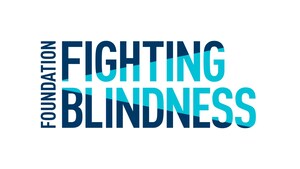COLUMBIA, Md., Dec. 19, 2017 /PRNewswire/ -- Today's U.S. Food and Drug Administration (FDA) approval of voretigene neparvovec, to be marketed as LUXTURNA™, will be life-changing for patients with vision loss due to mutations in the RPE65 gene and a watershed moment for the inherited retinal disease field, says the Foundation Fighting Blindness. The Foundation was an important early investor in LUXTURNA, providing $10 million in critical seed funding for the therapy.
The groundbreaking treatment is the first gene therapy for the eye and for any inherited disease to be approved by the FDA. The treatment restores vision by delivering working copies of the RPE65 gene directly into the retina, thereby compensating for the nonfunctional, mutated genes.
"We are thrilled for the patients whose lives will change dramatically because of this treatment," says David Brint, Foundation Fighting Blindness chairman. "We are also pleased to have this concrete example of the strength of the Foundation's strategy of identifying and investing early in promising treatments. Doing so helps attract industry investment that can usher promising treatments through clinical trials and ultimately FDA approval."
LUXTURNA is the result of more than two decades of research and development at the University of Florida, the University of Pennsylvania, Children's Hospital of Philadelphia, and Spark Therapeutics. The Foundation Fighting Blindness' seed investment allowed researchers to take the therapy through the early investigational stages critical to any treatment development.
"LUXTURNA will be life-changing for people with an inherited retinal disease caused by RPE65 mutations. For them, the treatment means a life of independence. Also important is the momentum this approval provides to other gene-based therapies — for the eye and other diseases — now in the clinic," says Benjamin Yerxa, PhD, Foundation CEO.
Twenty-four-year-old Katelyn Corey participated in the clinical trial that led to LUXTURNA's FDA approval. Before the trial, failing vision was causing her to consider giving up her lifelong dream of completing college and working in science. But, in December 2013, she received the RPE65 gene therapy in Spark's Phase 3 clinical trial, and her education and science career got quickly back on track.
"Within days, I could see vibrant colors. I could even see the Philadelphia City Hall clock tower at night," she says. "Also, now, I can go to a restaurant and see everything by candlelight, and I can see stars in the night sky." Corey recently earned a master's degree in epidemiology and now works as a research analyst for the U.S. Department of Veterans Affairs.
An additional noteworthy milestone is the demonstrated value of a new clinical endpoint devised by the Spark Therapeutics team to measure LUXTURNA's impact. The new measure, a multi-luminance mobility test (informally called the maze), measured the impact of the treatment beyond the traditional visual acuity measure — the eye chart. This new clinical endpoint moves vision measures beyond the eye chart, which is particularly significant for people with low or no vision.
Spark Therapeutics, which holds the biologics license for LUXTURNA and conducted the clinical trials that showed its safety and efficacy, will also manage the treatment rollout. Spark has announced that in order to ensure the treatment is safely administered, it will only be available through a small number of centers of clinical excellence across the country. Spark has also expressed its commitment to educating third-party payers about the value of LUXTURNA and to working to help ensure treatment access to all eligible patients.
Anyone in need of more information about LUXTURNA should contact Spark Therapeutics at 1-833-SPARK-PS (833-772-7577). Another resource for information is Spark's website: www.Sparktx.com.
The Foundation Fighting Blindness is the world's leading private funder of research on potential treatments and cures for inherited retinal degenerative diseases and currently funds 77 research projects overseen by 65 investigators at 67 universities, hospitals, and affiliated eye institutes worldwide. The Foundation was established in 1971 and has since raised more than $725 million toward its mission to prevent, treat, and cure blindness caused by inherited retinal diseases. In excess of 10 million Americans, and millions more worldwide, experience vision loss due to retinal degenerations. Through its support of focused and innovative science, the Foundation drives the research that has and will continue to provide treatments and cures for people affected by retinitis pigmentosa, LCA, macular degeneration, Usher syndrome, and other retinal diseases.
Contact: Bob Szafranski
Office: 312-240-2687
Cell: 312-863-9135
SOURCE Foundation Fighting Blindness
WANT YOUR COMPANY'S NEWS FEATURED ON PRNEWSWIRE.COM?
Newsrooms &
Influencers
Digital Media
Outlets
Journalists
Opted In






Share this article